主从句的时态问题
从句中时态运用的注意点

until,as soon as, before, after,after as,than,whether,where 等 引导的从句
、由if引导的条件状语从句、关系代词和正式的演讲中。 下面我们小结下从句中时态运用的注意点。1.一般现在时 表示将来。当主句为将来时态或
:I’ll give you anything you ask for. 你要什么我都给你。You can have anythin
g I find. 我找到的任何东西你都可以拿去。Everyone who comes first will get a prese
nt. 每个先来的人都可得到一份礼物。2.一般过去时表示 现在①由if引导的虚拟条件句,要用一般过去时表示现在。 如:If I had
lots of money,I'd give some to anybody who asked for it. (NOT...who
would ask for it)如果我有很多钱,我将给任何找我要的 人。If I had the money now I’d bu
y a car. 假若我现在有钱,我就买辆小汽车。②宾语从句 中,由于时态呼应的关系,可用一般过去时表示现在。 如:I didn’t k
er when I'll arrive。我想知道什么时候我能到达。I don't know if I'll be here tomo
rrow.我不知道我是否明天在这儿。
全文完!
北京同声传译公司 ty19htvv
her until the plane takes off.我将呆在这里直到飞机降落。 She'll be on the same
初中英语主句从句时态关系例句

初中英语主句从句时态关系例句宾语从句中,从句谓语动词的时态要与主句谓语动词的时态相呼应,主要体现在三个方面:1.主句的谓语动词是一般将来时、一般现在时或主句是祈使句时,从句的谓语动词根据实际情况选用具体的时态。
例如:It’s reported that Nanjing South Railway Station at the end of this month. (2011南京)A.has been completedB.is completedC.was completedD.will be completed此题中,从句的时间状语表示将来at the end of this month,主句又为现在时,故从句用将来时。
2.主句的谓语动词是一般过去时,从句的时态要相应地使用与过去相对应的时态,即一般将来时与过去将来时,一般现在时与一般过去时,现在完成时与过去完成时相对应。
例如:The woman asked the policeman where__.(2011重庆)A.the post officeB.the post office wasC.is the post officeD.was the post office 这道考题中,主句动词时态用了过去时,故从句应由原来的一般现在时改为一般过去时。
另外,有必要注意两个特殊的词would和could,它们常出现在中考题中。
would和could 经常用于表示客气、委婉的语气,不表示过去,从句时态应根据实际情况而定。
例如:(1)—Excuse me,I want to go to the 21st National BookExpo(展览会).Could you tell me__?—Sure.It is at No.3 Changjiang Road in Harbin.(2011哈尔滨)A.where it isB.where it wasC.where is it(2)—Would you please tell me__?—At 10:00 this evening.(2010福建晋江)A.when will the train leaveB.when the train will leaveC.when does the train leave3.如果从句反映的是科学事实、客观真理、名言警句时,时态一律都是一般现在时,不管主句用什么时态。
初中英语复合句中主、从句的时态问题
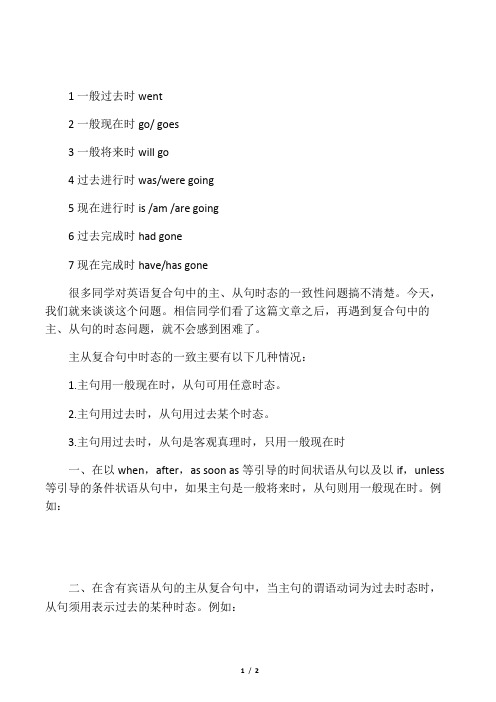
1一般过去时went2一般现在时go/ goes3一般将来时will go4过去进行时was/were going5现在进行时is /am /are going6过去完成时had gone7现在完成时have/has gone很多同学对英语复合句中的主、从句时态的一致性问题搞不清楚。
今天,我们就来谈谈这个问题。
相信同学们看了这篇文章之后,再遇到复合句中的主、从句的时态问题,就不会感到困难了。
主从复合句中时态的一致主要有以下几种情况:1.主句用一般现在时,从句可用任意时态。
2.主句用过去时,从句用过去某个时态。
3.主句用过去时,从句是客观真理时,只用一般现在时一、在以when,after,as soon as等引导的时间状语从句以及以if,unless 等引导的条件状语从句中,如果主句是一般将来时,从句则用一般现在时。
例如:二、在含有宾语从句的主从复合句中,当主句的谓语动词为过去时态时,从句须用表示过去的某种时态。
例如:He asked when they would go to the party.他问他们什么时候将去参加聚会。
Miss Green said she had been to Beijing before.格林小姐说她以前曾经去过北京。
三、在宾语从句中,当主句的时态为一般现在时、现在进行时、现在完成时等时态时,后面从句时态不受主句限制,可根据情况,选用各种适合的时态。
例如:Do you know when we'll have a football match?你知道我们什么时候举行足球赛吗?You know he has gone to Shanghai.你知道他已去上海了。
四、当宾语从句表述的是客观事实、科学真理、现在的习惯动作以及格言等时,其时态不受主句限制,而用一般现在时。
例如:The teacher told us that light travels faster than sound.老师告诉我们光速比音速要快。
(完整版)初中英语从句时态
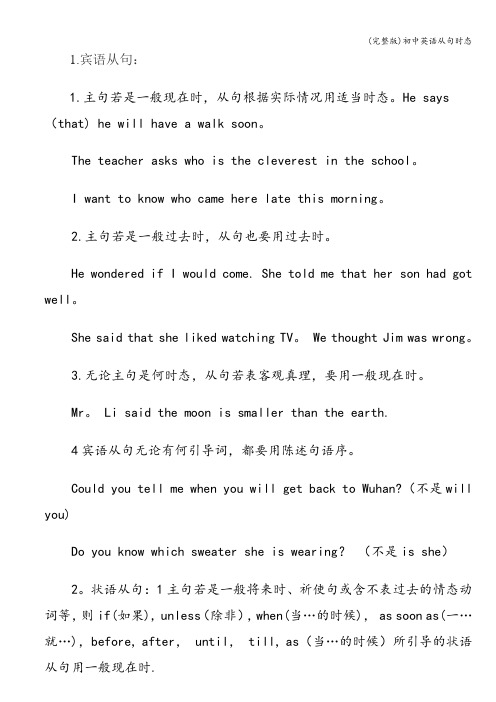
1.宾语从句:1.主句若是一般现在时,从句根据实际情况用适当时态。
He says (that) he will have a walk soon。
The teacher asks who is the cleverest in the school。
I want to know who came here late this morning。
2.主句若是一般过去时,从句也要用过去时。
He wondered if I would come. She told me that her son had got well。
She said that she liked watching TV。
We thought Jim was wrong。
3.无论主句是何时态,从句若表客观真理,要用一般现在时。
Mr。
Li said the moon is smaller than the earth.4宾语从句无论有何引导词,都要用陈述句语序。
Could you tell me when you will get back to Wuhan?(不是will you)Do you know which sweater she is wearing?(不是is she)2。
状语从句:1主句若是一般将来时、祈使句或含不表过去的情态动词等,则if(如果), unless(除非),when(当…的时候), as soon as(一…就…),before, after, until, till, as(当…的时候)所引导的状语从句用一般现在时.You may take a rest when you finish doing your work。
I will call you up if I leave for Shanghai next week.Wait for your brother at the bus station until he arrives.2而主句若是一般过去时,从句也要用过去时,如:I would give the money to the charity if I had a million dollars。
虚拟语气中主从句时态的判断
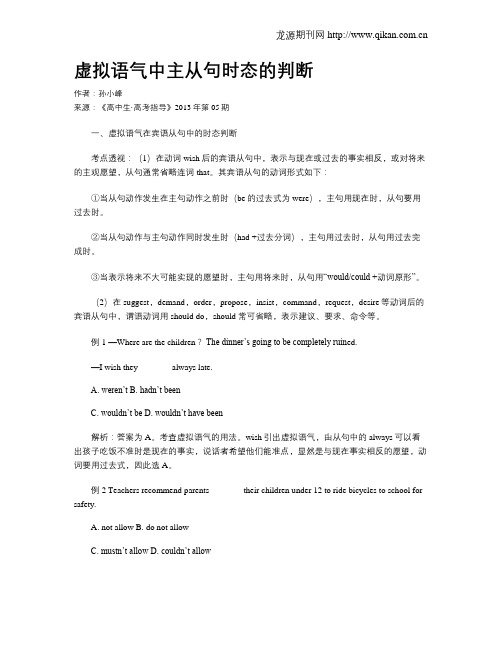
虚拟语气中主从句时态的判断作者:孙小峰来源:《高中生·高考指导》2013年第05期一、虚拟语气在宾语从句中的时态判断考点透视:(1)在动词wish后的宾语从句中,表示与现在或过去的事实相反,或对将来的主观愿望,从句通常省略连词that。
其宾语从句的动词形式如下:①当从句动作发生在主句动作之前时(be的过去式为were),主句用现在时,从句要用过去时。
②当从句动作与主句动作同时发生时(had +过去分词),主句用过去时,从句用过去完成时。
③当表示将来不大可能实现的愿望时,主句用将来时,从句用“would/could +动词原形”。
(2)在suggest,demand,order,propose,insist,command,request,desire等动词后的宾语从句中,谓语动词用should do,should 常可省略,表示建议、要求、命令等。
例1 —Where are the children?The dinner’s going to be completely ruin ed.—I wish they _______ always late.A. weren’tB. hadn’t beenC. wouldn’t beD. wouldn’t have been解析:答案为A。
考查虚拟语气的用法。
wish引出虚拟语气,由从句中的always可以看出孩子吃饭不准时是现在的事实,说话者希望他们能准点,显然是与现在事实相反的愿望,动词要用过去式,因此选A。
例2 Teachers recommend parents _______ their children under 12 to ride bicycles to school for safety.A. not allowB. do not allowC. mustn’t allowD. couldn’t allow解析:答案为A。
when引导的从句和主句用什么时态

when引导的从句和主句用什么时态
时间状语从句中,如果主句是现在的时态(现在进行时、现在完成时或一般现在时),从句可以用任意时态;如果主句是过去的时态(一般过去时、过去完成时、过去进行时、过去将来时),从句时态也必须用过去的时态(过去进行时、过去完成时、一般过去时、过去将来时)。
when,while,as都可以引导时间状语从句,但用法区别非常大,具体而言:
一、when可以和延续性动词连用,也可以和短暂性动词连用;而while和as只能和延续性动词连用。
①Why do you want a new job when you’ve got such a good one already?(get为短暂性动词)你已经找到如此好的工作,为何还想再找新的?
②Sorry,I was out when you called me.(call为短暂性动词)
对不起,你打电话时我刚好外出了。
③Strike while the iron is hot.(is为延续性动词,表示一种持续的状态)趁热打铁。
④The students took notes as they listened.(listen为延续性动词)学生们边听课边做笔记。
二、when从句的谓语动词可以在主句谓语动作之前、之后或同时发生;while和as从句的谓语动作必须是和主句谓语动作同时发生。
1.从句动作在主句动作前发生,只用 when。
①When he had finished his homework,he took a short rest.(finished先发生)
当他完成作业后,他休息了一会儿。
宾语从句主句和从句的时态
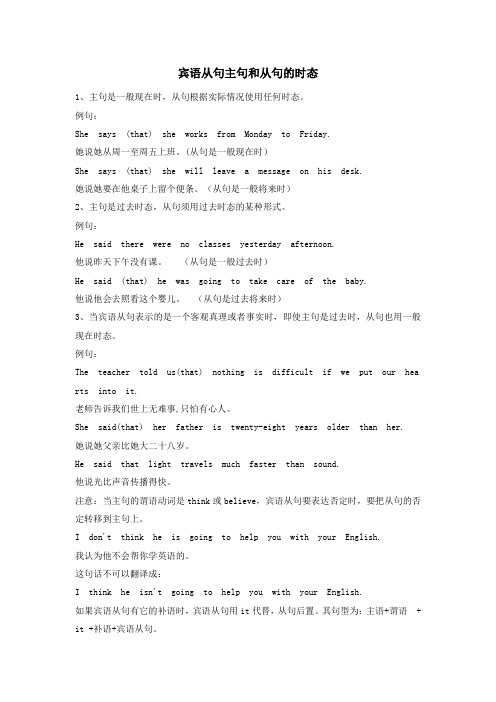
宾语从句主句和从句的时态1、主句是一般现在时,从句根据实际情况使用任何时态。
例句:She says (that) she works from Monday to Friday.她说她从周一至周五上班。
(从句是一般现在时)She says (that) she will leave a message on his desk.她说她要在他桌子上留个便条。
(从句是一般将来时)2、主句是过去时态,从句须用过去时态的某种形式。
例句:He said there were no classes yesterday afternoon.他说昨天下午没有课。
(从句是一般过去时)He said (that) he was going to take care of the baby.他说他会去照看这个婴儿。
(从句是过去将来时)3、当宾语从句表示的是一个客观真理或者事实时,即使主句是过去时,从句也用一般现在时态。
例句:The teacher told us(that) nothing is difficult if we put our hea rts into it.老师告诉我们世上无难事,只怕有心人。
She said(that) her father is twenty-eight years older than her.她说她父亲比她大二十八岁。
He said that light travels much faster than sound.他说光比声音传播得快。
注意:当主句的谓语动词是think或believe,宾语从句要表达否定时,要把从句的否定转移到主句上。
I don't think he is going to help you with your English.我认为他不会帮你学英语的。
这句话不可以翻译成:I think he isn't going to help you with your English.如果宾语从句有它的补语时,宾语从句用it代替,从句后置。
宾语从句主句和从句的时态关系

宾语从句主句和从句的时态关系在英语学习中,宾语从句是个重要但稍显复杂的部分,尤其是时态的运用。
很多人一听到时态就头疼,觉得复杂难懂,其实只要掌握了基本规则,事情会变得简单多了。
今天,我们就来聊聊宾语从句中时态的那些事儿,让你轻松搞定这一难题。
1. 主句和从句时态关系的基本规则1.1 主句的时态决定从句的时态首先,得知道一个基本原则:主句的时态会影响宾语从句的时态。
比如说,如果主句用的是一般现在时,那么宾语从句通常也用现在时。
就像“我知道他现在在家。
”这里的主句是现在时,所以宾语从句“他现在在家”也保持现在时。
1.2 过去时态的“接力”规则当主句的时态是过去时态时,从句的时态就要跟着调整。
这有点像接力赛,主句的过去时态传递给从句。
比如,“她说她昨天去了超市。
”主句是过去时“说”,所以宾语从句“她昨天去了超市”也得用过去时。
2. 主句与从句时态变化的常见情况2.1 从句的时态随主句的变化在主句是现在时的情况下,从句的时态一般不变。
例如,“我相信他会来。
”主句“我相信”是现在时,因此从句“他会来”用将来时,这样的用法可以表达对未来的预期。
2.2 条件句和时间状语从句的特别处理在一些条件句或时间状语从句中,宾语从句的时态有时会有所不同。
例如,“如果你告诉我你来晚了,我会帮你。
”这里,“你告诉我”用的是过去时,因为这是对过去可能发生的情况的假设。
3. 特殊情况的处理3.1 虚拟语气的时态有时候,宾语从句的时态和主句的时态会有所不同,尤其是在虚拟语气的情况下。
比如,“我希望你能早点到。
”这里主句是现在时,但宾语从句用的是虚拟的“能”。
虚拟语气表达的是一种假设或者愿望。
3.2 时间的延续和变化另外,当从句的动作发生在主句动作之前时,宾语从句也会用过去完成时。
例如,“我知道她已经完成了作业。
”主句“我知道”是现在时,但从句“她已经完成了作业”用的是过去完成时,因为动作发生在“知道”之前。
结语了解了这些规则,你会发现宾语从句的时态其实并没有那么难搞。
主语从句讲解和练习题

高考英语主语从句定义:用作主语的从句叫主语从句,它是名词性从句之一。
主语从句的时态:不受主句的时态影响和限制。
引导主语从句的连接词有:从属连词: that, whether;连接代词: who (whoever), whom, whose, what (whatever)和which (whichever);连接副词: when, where, how和why。
连接词:1. 从属连词:that,whether1)that引导主语从句只起引导作用,在主语从句中不充当任何成分,that本身无实际意义,但不能省略。
2)whether意为“是否”,放在句首句末皆可。
由whether引导的名词从句做主语,表语,介词宾语,同位语时!不可用if代替。
a.That price will go up is certain.b. Whether they would support us was a problem. 他们是否会支持我们还是一个问题。
2. 连接代词who ,what ,which, whatever, whichever, whoever (Who, whom, which, what 可以和ever构成合成词,和what一样引导从句,ever起到强调作用。
此类主语从句不能用形式主语it引导,它们在句子中担任成分,不能省略,语序为陈述语序,既有疑问含义,又起连接作用,同时在从句中充当各种成分。
Which side will win is not clear. Whoever breaks the law will be punished.Whatever he did is right. Who killed the scientist remains a question.1)What和that引导的主语从句的区别:that 只起引导作用,不充当任何成分,没有意思。
What 不仅起引导作用,还要充当一定成分(主语、宾语或表语),意思是:“什么”。
主过从过,主将从现,主现从任
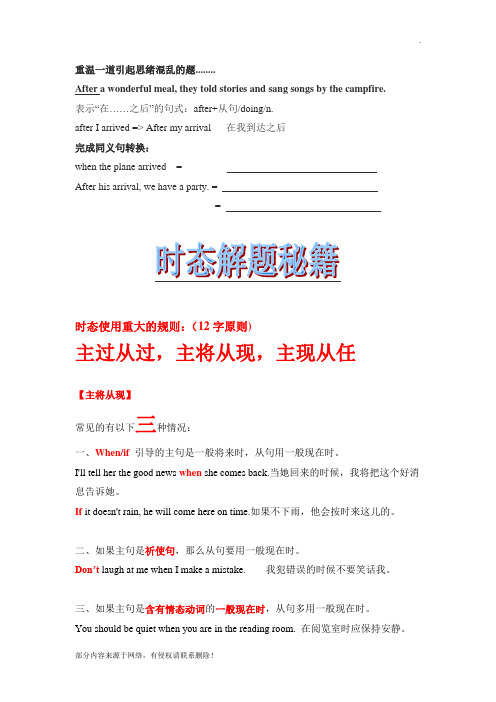
重温一道引起思绪混乱的题........After a wonderful meal, they told stories and sang songs by the campfire.表示“在……之后”的句式:after+从句/doing/n.after I arrived => After my arrival 在我到达之后完成同义句转换:when the plane arrived =After his arrival, we have a party. ==时态使用重大的规则:(12字原则)主过从过,主将从现,主现从任【主将从现】常见的有以下三种情况:一、When/if引导的主句是一般将来时,从句用一般现在时。
I'll tell her the good news when she comes back.当她回来的时候,我将把这个好消息告诉她。
If it doesn't rain, he will come here on time.如果不下雨,他会按时来这儿的。
二、如果主句是祈使句,那么从句要用一般现在时。
Don’t laugh at me when I make a mistake. 我犯错误的时候不要笑话我。
三、如果主句是含有情态动词的一般现在时,从句多用一般现在时。
You should be quiet when you are in the reading room. 在阅览室时应保持安静。
【主过从过】常见的有以下二种情况:1.直接引语变成间接引语2.宾语从句中,当主句的谓语动词为过去时态时,从句须用表示过去的某种时态。
例如:He asked when they would go to the party.他问他们什么时候将去参加聚会。
Miss Green said she had been to Beijing before.格林小姐说她以前曾经去过北京。
because主句和从句的时态

because主句和从句的时态
因为主句和从句的时态问题
在英语中,主句和从句之间有时态和语态的区别,因此,用because 引导的从句必须与主句的时态和语态匹配,才能表达出想要表达的含义。
一、一般现在时主句,一般现在时从句
这种情况最常见,主句和从句都用一般现在时表达。
用 because 引导的从句表示原因,此时,从句的谓语动词也用一般现在时。
例妢: He is late for school because he overslept. 他上学迟到是因为睡过头了。
二、一般过去时主句,一般过去时从句
主句和从句都用一般过去时表达。
此时,从句的谓语动词也用一般过去时:
He was late for school because he overslept. 他上学迟到是因为睡过头了。
三、现在进行时主句,现在完成时从句
主句用现在进行时表示正在发生的动作或正在进行的状态;从句则用现在完成时表示先前完成的动作,例如:
He is cooking in the kitchen because he has done his homework. 他正在厨房做饭,因为他已经做完家庭作业了。
四、现在完成时主句,现在完成时从句
主句用现在完成时表示上一次动作已经完成;从句的谓语动词也
用现在完成时,表示动作已完成,例如:
He has done his homework, so he can go out to play now. 他已经做完家庭作业了,所以他现在可以出去玩了。
主从句时态不一致原则-定义说明解析

主从句时态不一致原则-概述说明以及解释1.引言1.1 概述概述主从句时态不一致是指在一个句子中,主句和从句所表示的动作或状态所处的时间不一致。
这种情况可能会影响语句的连贯性和表达清晰度,因此在写作和口语表达中需要引起重视。
本篇文章将分析主从句时态不一致的情况,探讨影响语句连贯性的因素,并提出解决时态不一致问题的方法。
最终旨在总结主从句时态不一致的原则,强调正确使用主从句时态的重要性,以及时态不一致对语言表达的影响。
通过本文的阐述,读者可以更加清晰地理解和正确运用主从句时态不一致的原则,提高语言表达的准确性和流畅度。
1.2 文章结构文章结构部分的内容:本文主要分为引言、正文和结论三部分。
引言部分首先概述了主从句时态不一致的问题,并介绍了文章的结构和目的。
正文部分包括了主从句时态不一致的情况、影响语句连贯性的因素以及解决时态不一致问题的方法三个方面的内容。
结论部分总结了主从句时态不一致的原则,并分析了时态不一致对语言表达的影响,强调了正确使用主从句时态的重要性。
构部分的内容1.3 目的:本文旨在探讨主从句时态不一致的原则,以及时态不一致对语言表达的影响。
通过分析主从句时态不一致的情况和影响语句连贯性的因素,我们希望能够帮助读者更好地理解如何避免时态不一致,并提供解决问题的方法。
最终的目的是强调正确使用主从句时态的重要性,使文章表达更准确,逻辑更清晰,增强语言表达的说服力和可读性。
}}}}请编写文章1.3 目的部分的内容2.正文2.1 主从句时态不一致的情况在英语语法中,主从句时态不一致是一个常见的现象。
主从句时态不一致指的是主句和从句所表示的动作或状态所处的时间不一致。
这种不一致可能会导致语句的连贯性和语法的准确性受到影响。
主从句时态不一致的情况通常可以分为以下几种情况:1. 主从句表示的动作或状态发生的时间不一致。
比如,在一个复合句中,主句使用了现在时,而从句却使用了过去时,这样就导致了时态不一致的情况。
主从句时态不一致的情况

主从句时态不一致的情况好嘞,今天我们聊聊主从句时态不一致的那些事儿。
你知道的,有时候我们说话就像吃了一口泡泡糖,嘴里甜滋滋的,可一旦咬到那一瞬间,它就“啪”地一下,变得不那么顺了。
其实啊,这种情况在英语里也经常发生。
就像你和朋友一起吃火锅,突然发现某个调料太咸,瞬间想要换个味道,但又不想打破气氛。
那感觉真是妙不可言。
想象一下,你跟朋友说:“我觉得如果明天的天气好,我就去海边。
”这个句子里,“我觉得”是现在时,而“我就去”也是现在时,但“如果明天的天气好”里其实是个假设,得用将来时。
这就像你去买新鞋,结果发现买的不是自己的码,虽然鞋子看起来不错,但穿上脚就像踩了两块木板,根本不合适。
这样的时态不一致,听着怪怪的。
再想想那种经典的情景剧,角色们总是在拌嘴。
比如,A说:“如果你昨天告诉我,我就不会这么做。
”这句里的“如果你昨天告诉我”用的是过去时,而“我就不会”是将来时。
感觉像是一场戏,演员们时而跟随剧本,时而又即兴发挥,大家乐得哈哈大笑,可也真让人抓狂。
这就像你给朋友讲的一个搞笑故事,结果不小心把时间弄错了,朋友立马就冒出一句:“你上次不是说过那件事吗?”这瞬间,你的脑子就像被铅笔划了一下,瞬间懵了。
于是你不得不想:“哦,对啊,那我怎么又说成这样了?”这种时态的混乱就像是在打麻将,明明已经摸到了一张好牌,结果又把牌打错了。
你知道吗,有时候这种时态不一致还会让你变得更加幽默。
比如,你可以说:“如果我昨天学会了游泳,今天就不会淹死。
”哎呀,这个句子简直让人忍不住想笑。
虽然你明明没淹死,但这种夸张的表达反而让人觉得更生动、搞笑。
就像那些搞笑视频,明明是生活中的小插曲,却总能让你笑到肚子痛。
再说说那些口语中的小陷阱。
你可能会听到朋友说:“如果我当时知道,我现在就会是个亿万富翁。
”哎呀,这个“现在就会”跟“当时知道”之间的时态差别,就像你原本打算吃的巧克力,结果发现是过期的。
多可惜啊,这时态上的小错误就像一颗糖,外表光鲜,咬下去却发现是空的。
主从句的时态关系与高考命题
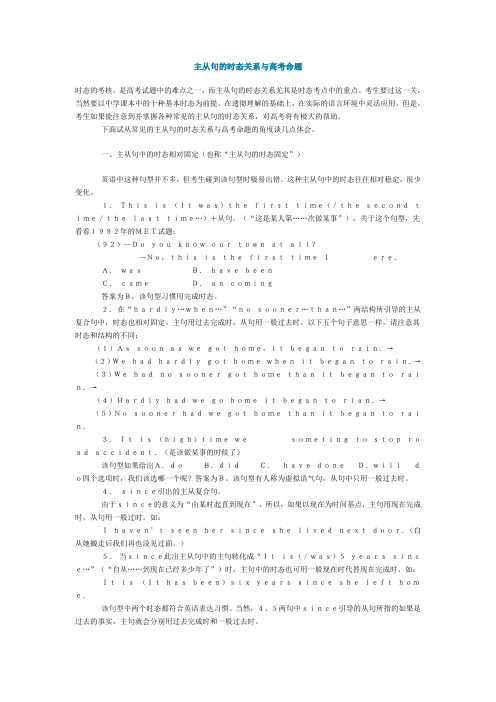
主从句的时态关系与高考命题时态的考核,是高考试题中的难点之一,而主从句的时态关系尤其是时态考点中的重点。
考生要过这一关,当然要以中学课本中的十种基本时态为前提。
在透彻理解的基础上,在实际的语言环境中灵活应用。
但是,考生如果能注意到并掌握各种常见的主从句的时态关系,对高考将有极大的帮助。
下面试从常见的主从句的时态关系与高考命题的角度谈几点体会。
一、主从句中的时态相对固定(也称“主从句的时态固定”)英语中这种句型并不多,但考生碰到该句型时极易出错。
这种主从句中的时态往往相对稳定,很少变化。
1.Thisis(Itwas)thefirsttime(/thesecondtime/thelasttime…)+从句。
(“这是某人第……次做某事”),关于这个句型,先看看1992年的MET试题:(92)—Doyouknowourtownatall?—No,thisisthefirsttimeIere.A.wasB.havebeenC.cameD.ancoming答案为B,该句型习惯用完成时态。
2.在“hardly…when…”“nosooner…than…”两结构所引导的主从复合句中,时态也相对固定。
主句用过去完成时,从句用一般过去时。
以下五个句子意思一样,请注意其时态和结构的不同:(1)Assoonaswegothome,itbegantorain.→(2)Wehadhardlygothomewhenitbegantorain.→(3)Wehadnosoonergothomethanitbegantorain.→(4)Hardlyhadwegohomeitbegantorian.→(5)Nosoonerhadwegothomethanitbegantorain.3.Itis(high)timewesometingtostoproadaccident.(是该做某事的时候了)该句型如果给出A.doB.didC.havedoneD.willdo四个选项时,我们该选哪一个呢?答案为B。
主从句谓语动词的时态

1.主从句谓语动词的时态(1)掌握主从句谓语动词的规范搭配:主句从句与现在事实相反would/情态动词过去式+do were (不分人称)/did与过去事实相反would/情态动词过去式+have done had done与将来事实相反would/情态动词过去式+do should do如:If the doctor had been available, the child could not have died.There is a real possibility that these animals could be frightened, should there be a sudden loud noise.(2)区分主从句表示的不同时间概念:主从句谓语动词所指时间不同,这叫做错综时间条件句,动词形式应根据实际情况来调整。
如:Had it not been for the timely investment from the general public, our company would not be so thriving as it is.(主句与现在事实相反,从句与过去事实相反)Had Paul received six more votes in the last election, he would be our chairman now.(主句与现在事实相反,从句与过去事实相反)(3)识别事实和假设混合句:Your math instructor would have been happy to give you a make-up examination had you gone and explained that your parents were ill at the time.(句子前半部分为假设情况,而“父母病了”是事实)I would have gone to visit him in the hospital had it been at all possible, but I was fully occupied the whole of last week.(前半部分为假设,后半部分是事实)2.名词性从句的虚拟形式名词性从句是指宾语从句、主语从句、表语从句和同位语从句。
虚拟语气中主从句时态的判断
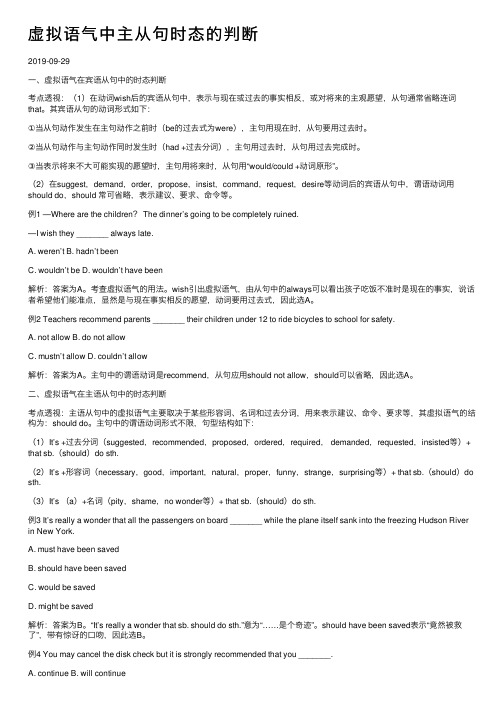
虚拟语⽓中主从句时态的判断2019-09-29⼀、虚拟语⽓在宾语从句中的时态判断考点透视:(1)在动词wish后的宾语从句中,表⽰与现在或过去的事实相反,或对将来的主观愿望,从句通常省略连词that。
其宾语从句的动词形式如下:①当从句动作发⽣在主句动作之前时(be的过去式为were),主句⽤现在时,从句要⽤过去时。
②当从句动作与主句动作同时发⽣时(had +过去分词),主句⽤过去时,从句⽤过去完成时。
③当表⽰将来不⼤可能实现的愿望时,主句⽤将来时,从句⽤“would/could +动词原形”。
(2)在suggest,demand,order,propose,insist,command,request,desire等动词后的宾语从句中,谓语动词⽤should do,should 常可省略,表⽰建议、要求、命令等。
例1 ―Where are the children? The dinner’s going to be completely ruined.―I wish they _______ always late.A. weren’tB. hadn’t beenC. wouldn’t beD. wouldn’t have been解析:答案为A。
考查虚拟语⽓的⽤法。
wish引出虚拟语⽓,由从句中的always可以看出孩⼦吃饭不准时是现在的事实,说话者希望他们能准点,显然是与现在事实相反的愿望,动词要⽤过去式,因此选A。
例2 Teachers recommend parents _______ their children under 12 to ride bicycles to school for safety.A. not allowB. do not allowC. mustn’t allowD. couldn’t allow解析:答案为A。
主句中的谓语动词是recommend,从句应⽤should not allow,should可以省略,因此选A。
主句是过去式从句用什么时态

主句是过去式从句用什么时态
1.主句用一般现在时,从句可用任意时态,可归纳为“主现从不限”;
2.主句用过去时,从句用过去某个时态,可归纳为“主过从四过”;
3.主句用过去时,从句是科学真理、客观常识、名人格言时用一般现在时;
4.情态动词could/would用于“请求”,表示委婉、客气的语气时,从句不受主句的约束。
由引导词if或unless引导的状语从句叫做条件状语从句。
在英文中,条件是指某一件事情实现之后(状语从句中的动作),其它事情(主句中的动作)才能发生,通常译作“假如”。
注意:在含有条件状语从句的复合句中,表示将来时态,主句是一般将来时态,祈使句或情态动词,从句要用现在时态,[主将从现原则](主将从现,将并非指将来时,还指表示将来含义的,跟着if后的那句话是从句。
语法引导条件状语从句最常用的连词是if,由if引导的条件状语从句表示在某种条件下某事很可能发生。
如:
1)If you ask him,he will help you.
如果你请他帮忙,他会帮你的。
2)If you fail in the exam,you will let him down.
如果你考试不及格,你会让他失望的
if引导的条件状语从句既可以将从句放前面也可以将从句放后面
(如果天下雨,我们就不玩了)If it rains,we will stop playing.
转为We will stop playing if it rains.。
- 1、下载文档前请自行甄别文档内容的完整性,平台不提供额外的编辑、内容补充、找答案等附加服务。
- 2、"仅部分预览"的文档,不可在线预览部分如存在完整性等问题,可反馈申请退款(可完整预览的文档不适用该条件!)。
- 3、如文档侵犯您的权益,请联系客服反馈,我们会尽快为您处理(人工客服工作时间:9:00-18:30)。
主从句的时态问题从句和主句中谓语动词的时态在复合句中,主句和从句的谓语动词时态一般遵循以下的规律:一① 在以下三种主语从句中,主语从句的谓语动词要用“should+动词原形”, should可省略。
(1)It is+形容词+that…句型。
常见的形容词有important, necessary, natural, funny, strange, surprising, astonishing(令人惊讶的)等。
(2) It is +名词+that…句型。
常见的名词有pity, shame, advice, suggestion, proposal(提议,建议), requirement, request, desire, order 等。
(3) It is+动词的过去分词+ that…句型。
常见的动词有advise, order, propose, request, suggest, demand, require等。
②在insist(坚持), urge (催促), order(命令), command(命令),suggest(建议),advise(建议),recommend(建议,推荐), request(请求,要求), demand(要求),require(要求,需要)等动词后的宾语从句中,谓语动词用“should+动词原形”, should可省略。
③ 在含有advice, order, demand, proposal(提议), requirement, suggestion等名词的表语从句、同位语从句中,谓语动词用“should+动词原形”,should可省略。
④在一些表示惊讶、意志等感情色彩的名词性从句中,谓语动词用“should+动词原形”或“should +have done”,译为“竟然,居然”。
例如:I am surprised /shocked that you should speak in such a way。
I find it astonishing that he should be so rude to his mum。
It is strange /surprising that she should not have been invited。
I am glad that your story should have won the first prize。
二①表示“同时”意义的连词as, when, as soon as, the moment, while 等连接的时间状语从句,主句和从句时态基本一致。
例如:As time passed, things seemed to get worse。
② 表示“将来”意义的条件、时间和让步状语从句中多用一般现在时,而主句用一般将来时,被称为“主将从现”。
在以when,after,as soon as等引导的时间状语从句以及以if,unless等引导的条件状语从句中,如果主句是一般将来时,从句则用一般现在时。
例如:I'll tell her the good news when she comes back.当她回来的时候,我将把这个好消息告诉她。
If it doesn't rain, he will come here on time.如果不下雨,他会按时来这儿的。
Tom won’t go to sleep unless his mother tells him a story。
Once I get him a job, he’ll be fine。
③ since引导的时间状语从句多用一般过去时,而含有since从句的主句通常用现在完成时。
例如:I haven’t met her since I left university。
在"since+点时间"句型中,主句通常用现在完成时,从句用一般过去时。
例如:He has worked at the factory since he came here.自从他来到这儿,他就一直在这家工厂上班。
另外,在句型"It's+段时间+since+从句"中,since后面的从句要用一般过去时。
例如:It's a long time since we met last.自从我们上次见面以来已经有好长时间了。
④在句式hardly/scarcely…when…, no sooner…than…中,第一个分句中过去完成时,第二个分句用一般过去时。
例如:She had hardly sat down when the phone rang。
如果主、从句表示的动作或状态都发生在过去,而且有先后,则在先的用过去完成时,在后的用一般过去时。
例如:When he got there, the train had left.当他到那儿的时候,火车已经开了。
He said he had visited the school before.他说他以前参观过那所学校。
⑤ 在as if/though 引导的状语从句中,如果表示一种与事实相反夸张,从句多用一般过去时或过去完成时。
例如:She stared at me as though I were a complete stranger。
三在宾语从句①当主句的谓语动词为过去时态时,从句须用表示过去的某种时态。
例如:He asked when they would go to the party.他问他们什么时候将去参加聚会。
Miss Green said she had been to Beijing before.格林小姐说她以前曾经去过北京。
②当主句的时态为一般现在时、现在进行时、现在完成时等时态时,后面从句时态不受主句限制,可根据情况,选用各种适合的时态。
例如:Do you know when we'll have a football match?你知道我们什么时候举行足球赛吗?You know he has gone to Shanghai.你知道他已去上海了。
③当宾语从句表述的是客观事实、科学真理、现在的习惯动作以及格言等时,其时态不受主句限制,而用一般现在时。
例如:The teacher told us that light travels faster than sound.老师告诉我们光速比音速要快。
When I was a student, my teacher often told us that time and tide wait for no man.当我还是学生的时候,老师常常告诉我们,岁月不等人。
随堂练习1. We should learn from those ______ are always ready to help others.A. whoB. whomC. theyD. that2. Mr. Herpin is one of the foreign experts who ______in China.A. worksB. is workingC. are workingD. has been working3. Tom is the only one of the students who ______ to Shanghai.A. have goneB. have beenC. has beenD. had gone4. I, ______ your good friend, will try my best to help you out.A. who isB. who amC. that isD. which am5. The old man has two sons, ______ are lawyers.A. both of themB. both of whoC. both ofwhom D. both of they6. He is a man of great knowledge, ______ much can be learned.A. in whomB. about whomC. from whomD. of whom7 Do you know the man ______ just now?A. to who I noddedB. I nodded toC. whom I noddedD. Whom I nodded to him.8. The man ______ has gone to Japan.A. whom I told youB. that I told youC. whom I told you about himD. I told you about9. Please pass me the dictionary ______ cover is black.A. whichB. itsC. whoseD. which of10. The radio set ______ last week has been out of order.A. I boughtB. I bought itC. which I boughtit D. what I bought定语从句复习[参考答案]1-5 ACCBC 6-10 CBDCA 11-15 CDCAC 16-20 CDACA21-25 BBBCC 26-30 ABBBB 31-35 DBBDB 36-40 DA DCC41-45 CADCC 46-50 CCCCB。
